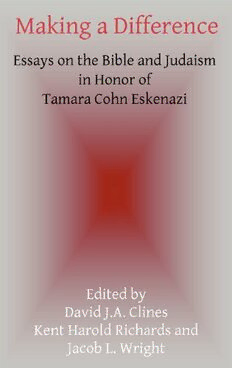
Making a Difference: Essays on the Bible and Judaism in Honor of Tamara Cohn Eskenazi PDF
Preview Making a Difference: Essays on the Bible and Judaism in Honor of Tamara Cohn Eskenazi
M D aking a ifference Hebrew Bible Monographs, 49 Series Editors David J.A. Clines, J. Cheryl Exum, Keith W. Whitelam Editorial Board A. Graeme Auld, Marc Brettler, David M. Carr, Paul M. Joyce, Francis Landy, Lena-Sofia Tiemeyer, Stuart D.E. Weeks M D aking a ifference Essays on the Bible and Judaism in Honor of Tamara Cohn Eskenazi Edited by David J.A. Clines, Kent Harold Richards and Jacob L. Wright Sheffield Phoenix PreSS 2012 Copyright © 2012 Sheffield Phoenix Press Published by Sheffield Phoenix Press Department of Biblical Studies, University of Sheffield Sheffield S3 7QB www.sheffieldphoenix.com All rights reserved. No part of this publication may be reproduced or transmitted in any form or by any means, electronic or mechanical, including photocopying, recording or any information storage or retrieval system, without the publisher’s permission in writing. A CIP catalogue record for this book is available from the British Library Typeset by CA Typesetting Ltd Printed on acid-free paper by Lightning Source UK Ltd, Milton Keynes ISBN-13 978-1-907534-72-0 Contents Preface ix List of Abbreviations xii List of Contributors xiv Publications of Tamara Cohn Eskenazi xx RabbiniC DiRges anD the VoiCes of Women in Lament Rachel Adler 1 the sWeet Lie of metaphoR: LeVinas’s RefLeCtions on metaphoR anD theiR impLiCations foR bibLiCaL heRmeneutiCs Annette Aronowicz 9 eDuCating JeWish giRLs in meDieVaL musLim anD ChRistian settings Judith R. Baskin 19 maDame potiphaR ReVisiteD out of anD in the CLassRoom Athalya Brenner 38 the poLitiCs of maRRiage in genesis Mark G. Brett 49 the VoiCe anD the book Catherine Chalier 60 the faiLuRe of the fLooD David J.A. Clines 74 miCah Yosef beRDYCzeWski anD the neW JeWish mimesis: tWo stoRies in honoR of tamaRa C. eskenazi William Cutter 85 pauL Vis-à-Vis LeVinas Pamela Eisenbaum 105 vi Making a Difference a zionist ReaDing of abRaham geigeR anD his bibLiCaL sChoLaRship David Ellenson 121 the LaW tRiumphant: anotheR Look at 1 esDRas Lisbeth S. Fried 132 stanDing again at sinai? Frederick E. Greenspahn 139 the Composition of ezRa–nehemiah fRom the peRspeCtiVe of a meDieVaL JeWish CommentatoR Sara Japhet 148 the samaRitan sChism oR the JuDaization of samaRia? Reassessing Josephus’s aCCount of the mt geRizim tempLe Gary N. Knoppers 163 LeVinas on pRopheCY Francis Landy 179 ‘WheRe WeRe You When i founDeD the eaRth?’ poetiC subVeRsions of a human-CenteReD WoRLD in Job Adriane Leveen 204 making a DiffeRenCe, then anD noW: the VeRY DiffeRent LiVes anD afteRLiVes of Dinah anD Rizpah Heather A. McKay 224 bLooD in the post-fLooD WoRLD David L. Petersen 242 faReWeLL to ‘mR so anD so’ (Ruth 4.1)? Jack M. Sasson 251 RenDeRing the RenDing of the VeiL: What DiffeRenCe Does it make? Jesper Svartvik 257 esChatoLogY in the book of ezekieL Marvin A. Sweeney 277 Contents vii DiffeRenCe among the Distaff: a ReaDing of exoDus 1.1–2.10 Phyllis Trible 292 amos anD the CuLt Gene M. Tucker 307 motiVes behinD bibLiCaL mixeD metaphoRs Andrea L. Weiss 317 sCRibe anD sCRoLL: ReVisiting the gReat isaiah sCRoLL fRom QumRan H.G.M. Williamson 329 betWeen nation anD state in the book of samueL: the Case of ittai the gittite Jacob L. Wright 343 Index of References 353 Index of Authors 362 pRefaCe Tamara Cohn Eskenazi has a special place in contemporary biblical schol- arship. Among the first to bring a focus of scholarly attention to the period of ancient Israel’s creativity after the Exile, she has also been a leader in foregrounding the Jewish tradition within the interpretative discourse of biblical scholars. And, as a woman scholar, she has advanced the study of issues in the Hebrew Bible that impinge on the concerns of women ancient and modern, while as a teacher and friend she has encouraged and developed the talents of many younger scholars. She has indeed been ‘making a difference’ in the world of scholarship and in the lives of her wide circle of friends. Tamara Eskenazi was born in Israel, of Hungarian parents, and emigrated to the United States as a teenager in 1956. She married young, not begin- ning a university career until her mid-thirties. But once she began a degree in philosophy in the University of Denver in 1972 she found herself intel- lectually captivated. She never lost the excitement of new horizons, new books, and new conversation partners. She followed her philosophy degree with a MA in Religious Studies at Denver, submitting a thesis on ‘Paul and the Dead Sea Scrolls on the Law’. Thereafter she began her doctoral work at Iliff School of Theology and the University of Denver, culminating in her dissertation in 1986, under the direc- tion of Kent Richards. Her dissertation became her first book, In an Age of Prose: A Literary Approach to Ezra–Nehemiah (Society of Biblical Literature Monograph Series, 36; Atlanta: Scholars Press, 1989). It was something of a novelty in combining serious historical research with the discipline of biblical literary criticism as it was taking shape in that decade. Her grand insight was that the whole of Ezra–Nehemiah, disparate in origin though its parts may be, formed a true literary unity, with three dynamic elements: potentiality (Ezra 1.1-4), actualization (Ezra 1.5–Neh. 7.72) and success (Neh. 8.1–13.31). Key to its view of history were the centrality of the community in the postexilic reconstruction, the broadening out of the concept of the ‘house of God’ to include the whole city of Jerusalem and not just the temple, and the role of (even unwritten) texts as the vehicle for divine communication. There was a strong undercurrent here of a refusal of submission to hierarchy and an open- ness to valuing the roles of outsiders—foreigners, women, the poor.
